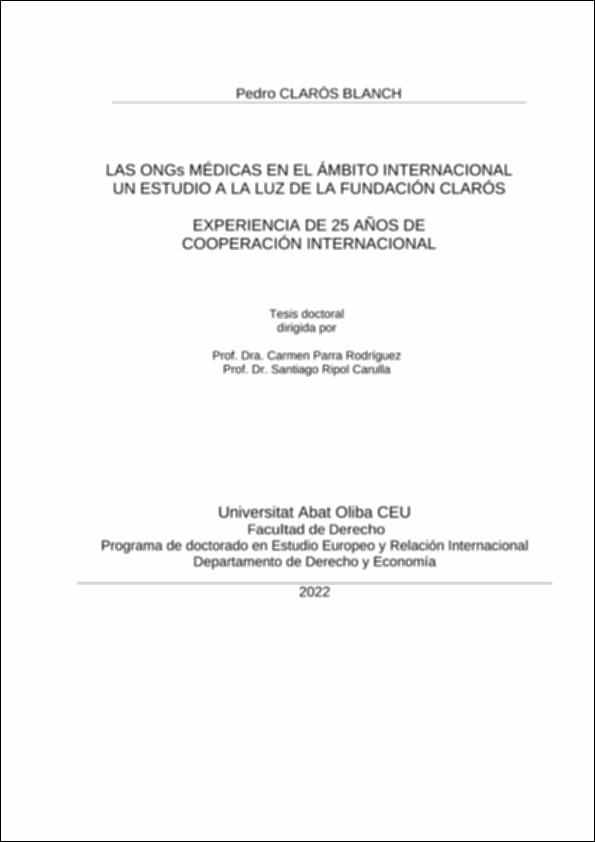Por favor, use este identificador para citar o enlazar este ítem:
http://hdl.handle.net/10637/14234Las ONGs médicas en el ámbito internacional: experiencia de 25 años de Cooperación Internacional
| Título : | Las ONGs médicas en el ámbito internacional: experiencia de 25 años de Cooperación Internacional |
| Autor : | Clarós Blanch, Pedro |
| Materias: | Derecho internacional.; Organizaciones no gubernamentales.; Planificación estratégica. |
| Resumen : | Introducción La realización de una misión humanitaria por parte de una ONGs de carácter médico comporta una actividad en la que hay muchos vacíos jurídicos y con frecuencia, estas, no cumplen con los requisitos adecuados y menos en la rendición de cuentas de las actividades realizadas. Hoy, o no hay o es escasa la obligación de reportar los resultados obtenidos al término de una Short Term Medical Mission InternationaI, tanto ya sea en territorio nacional o internacional. Objetivos El objetivo principal de esta Tesis Doctoral es poner de manifiesto la importancia de los diferentes aspectos del Derecho Internacional en el funcionamiento de una ONG de carácter médico, ligándolos con las estructuras de organización, gestión, actividades y, sobre todo, el cumplimiento de los objetivos marcados por las ONGs. Así mismo se busca hacer hincapié en la falta o vacío de normas estrictas que deben guiar los resultados alcanzados por estas instituciones. Se pretende detectar, analizar y detallar los fallos encontrados por el autor de esta Tesis Doctoral a lo largo de una experiencia de 25 años con el ejercicio de un número importante de STMMIs en un gran número de países emergentes donde se han llevado a término dichas misiones. Resultados Tras la exposición de todos los aspectos que se han tratado en la Tesis Doctoral se ha llegado a las conclusiones que hace falta establecer unas normas que compongan un Código de Conducta, Carta o Guía de las ONGs que regulen la actuación de las misiones humanitarias en actividades de STMMIs contemplando las reglas del Derecho Internacional. A su vez este vacío en las leyes reguladoras es el responsable de la falta de transparencia de la actuación en algunas ONGs, y solo con un control más estricto a nivel nacional e internacional se podrán disminuir los defectos de forma y actuación. Si las ONGs colaboran con los Estados se podrá conseguir que estas tengan más influencia y votos posibles delante de la OMS para incorporar los cambios oportunos. Del mismo modo, así se podría obligar a todas las instituciones a que colaboren con estas normas. Las ONGs son independientes del Estado, pero es bueno que este las escuche y ayude. Introduction The performance of a humanitarian mission by a medical NGO involves an activity in which there are many legal loopholes and often they do not comply with the appropriate requirements and even less in the accountability of the activities carried out. Today, there is little or no obligation to report on the results obtained at the end of a STMMI, whether on national or international territory. Objectives The main objective of this Doctoral Thesis is to highlight the importance of the different aspects of International Law in the operation of a medical NGO, linking them with the organizational structures, management, activities and, above all, the fulfillment of the objectives set by the NGOs. In addition, to emphasize the lack or void of strict rules that should guide the results achieved by these institutions. To detect, analyze and detail the failures encountered during 25 years of experience with the exercise of a significant number of STMMIs conducted by the author of the Doctoral Thesis in a large number of emerging countries where these missions were completed. Results After the exposition of all the aspects that have been dealt with in the Doctoral Thesis, we have reached the conclusions that it is necessary to establish norms that compose a Code of Conduct, Charter or Guide for NGOs that regulate the performance of humanitarian missions in STMMIs activities, contemplating the rules of International law. In turn, this vacuum in the regulatory laws is responsible for the lack of transparency in the performance of some NGOs, and only with stricter control at the national and international level will it be possible to reduce the defects of form and performance. If the NGOs collaborate with the States, it will be possible for them to have more influence and possible votes before the WHO to incorporate the appropriate changes. In the same way, oblige all institutions to collaborate with these norms. NGOs are independent from the state, but it is good that the State listens to them and helps them, as well. |
| Descripción : | Tesis CEINDO,Universitat Abat Oliba CEU, Programa de doctorado "Derecho y Economía". Leída el 27-marzo de 2023 |
| Director(es): | Parra Rodríguez, Carmen Ripol Carulla, Santiago |
| Fecha de defensa: | 27-03-2023 |
| URI : | http://hdl.handle.net/10637/14234 |
| Derechos: | http://creativecommons.org/licenses/by-nc-nd/4.0/deed.es |
| Fecha de publicación : | 6-may-2023 |
| Centro : | Universitat Abat Oliba CEU |
| Aparece en las colecciones: | Derecho y Economía |
Los ítems de DSpace están protegidos por copyright, con todos los derechos reservados, a menos que se indique lo contrario.


